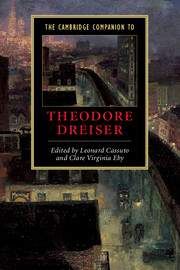Introduction
Published online by Cambridge University Press: 28 May 2006
Summary
“Dreiser more than any other man, marching alone, usually unappreciated, often hated, has cleared the trail from Victorian and Howellsian timidity and gentility in American fiction to honesty and boldness and passion of life. Without his pioneering, I doubt if any of us could, unless we liked to be sent to jail, seek to express life and beauty and terror.” The speaker of these words was Sinclair Lewis, on the occasion of becoming the first American writer to receive the Nobel Prize for literature. Lewis spoke for a generation of writers when he lauded Dreiser for sweeping aside old models and providing American literature’s “first fresh air since Mark Twain and Whitman.” In acknowledging Dreiser’s leadership, Lewis gave voice to a widespread feeling in the American literary community: that Dreiser was the one who should have won the prize.
Dreiser’s recognition as America’s leading novelist during the period preceding World War II marked the apex of a circuitous lifetime odyssey that saw him move from anonymity to notoriety to triumph. His work went briefly into eclipse after his death during the heyday of the New Criticism (which privileged modernist experimentation and looked down on Dreiser’s straightforward storytelling). With historically oriented approaches to literature regaining ground in the past generation, Dreiser has risen once again to a central position in the American canon. Ironically, years after his death, Dreiser is now getting what he always wanted: a uniform edition of his work, an enterprise sponsored by two university presses. His fiction has become a staple of the American literary curriculum. In short, his importance is now assured.
- Type
- Chapter
- Information
- The Cambridge Companion to Theodore Dreiser , pp. 1 - 12Publisher: Cambridge University PressPrint publication year: 2004

